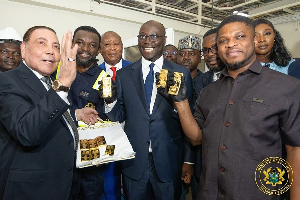by Cletus D Kuunifaa
Ghana is hitting the news day in day out with the most recent of all being the visit of the world number two billionaire and philanthropist Bill Gates. The world renowned philanthropist was in the country to inspect some projects of “The Bill and Melinda Gate’s Foundation on his first private visit to Ghana. His two-day working visit was to see some of the projects his Foundation is executing and to participate in an immunization tour. He had a full plate of items to check on his to do list.
Mr. Gates was in the country to, as he blogged on his website, “see firsthand why the country’s immunization system is working so well”. According to the renowned philanthropist, health delivery systems for some people might not seem like the most intriguing topic, but that he was really interested in understanding how Ghana did much of this right. He commended Ghana’s approach to immunization and advanced key reasons why it works so well: Rigorous data gathering and analysis, accountability at the district level, and community outreach. He then argued that strong immunization systems were crucial for protecting the gains against polio and helping to reach mothers and children with new vaccines and other life-saving health services. Citing Ghana as an example, Mr. Gates said polio was eliminated a decade ago and that an outbreak in 2008 was quickly controlled. “No child there has died from measles since 2002. And Ghana was the first country to launch two new vaccines last April, against rotavirus, which causes severe diarrhea, and pneumococcal pneumonia,” the philanthropist noted.
This by all indications is good news and Ghana continues to count her blessings so that more blessings could be added. Nothing speaks more profoundly to the visit of this selfless man than his passion to make the world a better place for all. The visit has been exciting for him as he continued blogging about it: “We’re then going to visit a community health center where the nurses also go out to find mothers who missed appointments or children due for immunizations to make the program as thorough as possible.” Mr. Gates said he plans to share “his experience in Ghana at the Global Vaccine Summit in Abu Dhabi April 24-25, where global health leaders would celebrate progress in immunization and demonstrate how the world is united to give all children a healthy start to life". “I'll speak with many of the leaders who are working so hard to reach every child with vaccines, including Dr K.O. Antwi-Agyei, who manages the national immunization programme,” he blogged. Mr. Gates added that “He was also excited to talk to some of the well-trained community health nurses and meet some of their local clients.” The renowned philanthropist promised in his next post that he will tell some of the lessons that can be learnt from Ghana’s success.
Bill Gates would have done his homework right for the choice of this huge investment in philanthropy in Ghana. He’s since left the country, but it’s time for us to take cue and learn some lessons. When you think about poverty wrapped in disease, hunger, ignorance, lack of education, housing and sanitation issues, and you look at tight budget constraints to deal with these issues, then you immediately appreciate the philanthropic work of this man investing billions of dollars in key sectors like health and education just to make the lives of people better on this earth.
At a meeting with President Mahama at the Flagstaff House on Tuesday, the second richest man in the world said he was impressed with Ghana’s development in the immunization of Tuberculosis and other related diseases. Thank God, the billionaire found value for his investment and was looking at the possibility of supporting health development and agriculture in Ghana. What a pure heart this man has! President Mahama lauded his efforts and said the support from the Bill Gates’ Foundation had helped to boost the nutritional needs of children and increase school enrolment, making Ghana reach the universal enrolment level.
Now, what can we do as a nation to sustain the foundation’s work so that millions of lives will continue to be improved upon? Interestingly, the School Feeding Programme has been the subject of intense controversy mired with selfish attitudes, corruption and or nepotism. Should this man read about the mess of the School Feeding Programme, what will be his thoughts? It is about time we began flushing out the bad nuts in the system.
Ghana must wake up all of a sudden from her slumber: President Mahama has attributed Ghana's water crisis to dysfunctional administration and inefficient management. He has therefore tasked the sector minister to restructure the water company and inculcate into new managers international best practice. As if to tell management that …hey, you are fired! For how long has the Ghana Water Company been in operation? Why should we have to ration water which is an essential commodity and is life and a fundamental human right to have? The President’s call is in the right direction and the faster these managers get it right, the better. Vice President Amissah-Authur on the other hand, is equally unhappy and has deplored the inadequate coordination and collaboration among state agencies handling economic matters, and has charged them to urgently improve the situation. Regrettably, he said the poor coordination has resulted in the situation where accurate data on the economic indicators are difficult to be accessed in a timely manner for development purposes. "We need accurate data to be able to plan appropriately, and also assure the market of the performance of the economy," he said. "I believe we need to tackle difficult problems and not postpone them, and we can effectively address the challenges in a timely manner when accurate information is available," he stressed.
Simply put, it is imperative to overhaul our system and take stock of what needs to be eliminated and what needs to be improved upon. Bill Gates was in the country to get firsthand information about his projects and the lessons that could be learned. Ghana can take a cue and do same to improve service delivery across board. President assured him that the government was adopting new ways of tackling the sanitation situation in the country. I am happy the President is on track to restructuring the system.
By Cletus D Kuunifaa, Long Island University, LIU Post, New York. Can be contacted at dipnibe@yahoo.com or Follow him on twitter @ckuunifaa
Opinions of Saturday, 30 March 2013
Columnist: Kuunifaa, Cletus D














